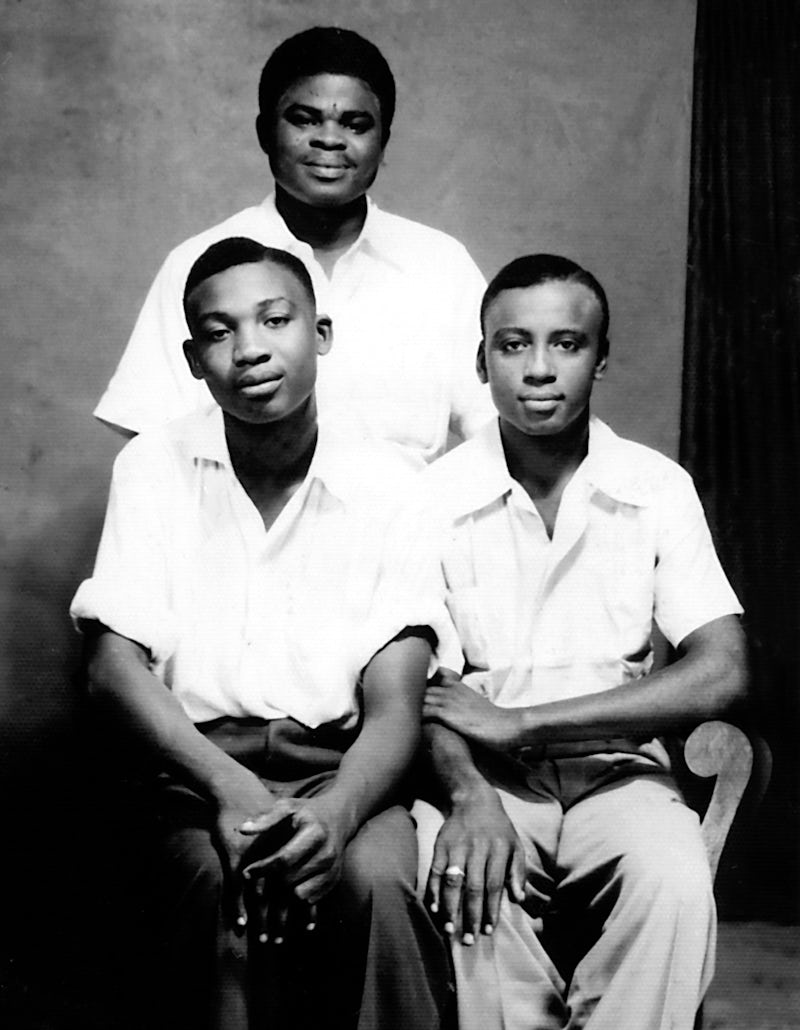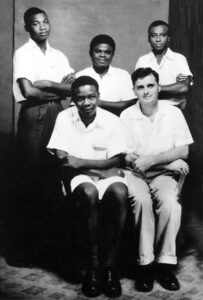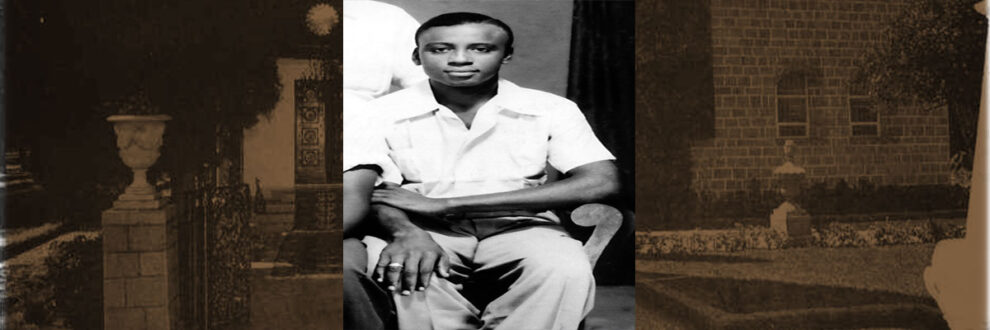
Samuel Njiki
Born: 1935
Death: October 5, 1983
Place of Birth: Batala-Bangante, Nde Division, Western Province, Republic of Cameroon
Location of Death: New Town, Limbe, Cameroon
Burial Location: No information
Mr. Njiki Samuel Njenji, known as Samuel Njiki, was the first Bamilike tribesman to embrace the Faith of Bahá’u’lláh. The son of Mr. Njenji Isaiah and Mrs. Minkeu Marie, both of Batala, he was educated at the primary school level and later on successfully completed a course in typewriting. In 1974, he obtained an Advance Diploma in Salesmanship in London.
Mr. Njiki was employed as a typist with Cameroon Development Co-operation (CDC) in the area oflice in Bota from 1950 to 1954. Early in 1954 he came into contact with the Bahá’í Faith through Mr. Enoch Olinga, a Ugandan from Teso, who, although he was himself a relatively new Bahá’í, had travelled 3,000 kilometres from his home to settle in West Africa to open Cameroon to the Bahá’í Faith. For his service in opening British Cameroon to the Cause of Bahá’u’lláh in October 1953, Shoghi Effendi designated Mr. Olinga a Knight of Bahá’u’lláh; in October 1957 he was named by the Guardian a Hand of the Cause.

Writing of Mr. Olinga in Baha’i’ News, May 1984, Mr. Don Addison, who is an ethnomusicologist specializing in African studies and who served as a faculty member at the University of Nigeria, Nsukka, from 1981 until 1983, stated, ‘When one strives . . . to appreciate how strong are the cultural ties that bind an African to his traditional society, and to his indigenous culture (and hence to his very identity) it becomes all the more clear what an amazing example Enoch Olinga must have been to others when he set out for Cameroon. Most Africans in their whole lives never travel more than a few miles from their home areas (isolated cases for education or business being the most notable exception), let alone to other countries, so the feat that Mr. Olinga accomplished by settling in West Africa was, in and of itself, truly inspiring.’
At the intercontinental conference held in Kampala, Uganda, from February 12 to 18, 1953 there had been read the message from Shoghi Effendi calling for the opening of ‘that phase of the Ten-Year Crusade which, God willing, will culminate in the introduction of our glorious Faith in all the remaining territories of that vast continent [Africa] as well as the chief neighbouring islands lying in the Indian and the Atlantic Oceans.” Among the thirty-three virgin territories and islands assigned to Africa was British Cameroon as well as French Cameroon. In a cablegram dated February 8, 1954, Shoghi Effendi reported on the progress of the Ten-Year Crusade and stated that ‘All African States, Colonies, Protectorates and Trust territories, with the exception of Togoland, Spanish Guinea, Bechuanaland, Swaziland, Gambia and the French Cameroons have been opened.”
A few weeks after Mr. Samuel Njiki became a Bahá’í he heard Mr. Olinga read the stirring and history-making cable from the Guardian requesting the opening to the Faith of the remaining unopened territories in West Africa. Immediately five people arose to fill these goals. Among them was Mr. Njiki who in April 1954 moved to Douala, in what was then French Cameroon, an act for which he was designated by Shoghi Effendi a Knight of Bahá’u’lláh. Softspoken and gentle, Mr. Njiki later recalled those unique times, remarking how unaware he and the other local believers were of the true implications and deep significance of the Guardian’s call, but adding that theyiwere united in their eagerness to arise and spread the healing message of Bahá’u’lláh. Arriving at his post on April 9, 1954 Mr. Njiki cabled the Guardian: ARRIVED. GRATEFUL PRAYERS KNOWLEDGE UNDERSTANDING ESTABLISH COMMUNITY VIRGIN LAND ALSO OVERCOME DIFFICULTIES’ I MAY MEET.
Mrs. Meherangiz Munsilf, an Indian believer resident in England, also arose to open French Cameroon to the Faith, arriving at her goal on April 16, 1954. She, too, was named a Knight of Bahá’u’lláh for this service. Although she and Mr. Njiki reached Douala only days apart, they had not met one another before their arrival. They met by pre-arrangement at the Post Ofifice where Mr. Njiki sat on the steps clasping as identification his Bahá’í prayer book. A re-enactment of their meeting was recorded on film within minutes of their having met, and the resulting photograph of Mr. Njiki, showing him seated on a bench, holding his prayer book as though awaiting his fellow pioneer, appeared in the June 1954 issue of the Indian Bahd’z’ News Bulletin, No.69. A news item in that same issue reports the arrival of the two pioneers at their post, and notes that although Mr. Samuel Njiki fell ill and was in hospital for some time, he had recovered and joined Mrs. Munsiff in winning friends among the local people.
On August 24, 1954, the assistant secretary wrote to Mr. Njiki on Shoghi Effendi’s behalf saying how pleased the Guardian was with ‘the sacrificial services’ Mr. Njiki was rendering, and adding: ‘The Guardian becomes very happy when he contemplates the fact that so many of the new African Bahá’ís have arisen to pioneer for the Faith. He feels those of you who are doing this are laying the foundation for great spiritual service in the Cause of God, that you are rendering historic service, and that you are becoming the honour and glory of the African people. The full extent of your deeds and services is not known now, but in the future they will be greatly valued and appreciated.’ After assuring Mr. Njiki that the Guardian would oifer prayers on his behalf, the assistant secretary continued: ‘He is hoping that through the confirmation of the Holy Spirit, you will be able to bring the light of Divine Guidance to many of the native inhabitants of the French Cameroons.’
Mr. Njiki remained at his pioneering post in Douala until 1956.‘ Upon returning he settled in New Town, Limbe. Eventually he occupied a modest home near the Local Centre in New Town, remaining there until his passing on October 5, 1983, after undergoing surgery at Provincial Hospital. From January 1972 until his death he was employed by the Ministry of Equipment, Department of Construction.
Samuel Njiki was married to Ndawoua Pauline by whom he had four children, Bless, Nancy and Lawrence, and an infant born after Mr. Njiki’s passing.
In addition to his pioneering service, Mr. Njiki was a member of the Spiritual Assembly of Limbe up to the time of his death and, to the degree that his deteriorating health permitted, he participated in the teaching work and served on various committees including the Local Ḥaẓíratu’l-Quds Committee and the Local Visiting Committee. The name of Samuel Njiki will be remembered through the ages for the part he played in what surely will be acclaimed in future as one of the most important and thrilling episodes in the annals of the Bahá’í Faith on the African continent.
(Adapted from a memoir by the NATIONAL SPIRITUAL ASSEMBLY OF CAMEROON)
DEEPLY GRIEVED PASSING KNIGHT BAHAULLAH SAMUEL NJIKI HIS DEVOTED PIONEERING SERVICES CAMEROON WARMLY REMEMBERED. PRAYING SHRINES PROGRESS HIS SOUL HEAVENLY KINGDOM ASSURE RELATIVES LOVING SYM PATHY. October 23, 1983 Universal House of Justice
Source:
The Baha’i World. Kidlington, Oxford: George Ronald Publisher. Volume 19 pages 615-616
-Permission given by George Ronald, Publishers
Images:
Baha’i World News Service





Add Comment